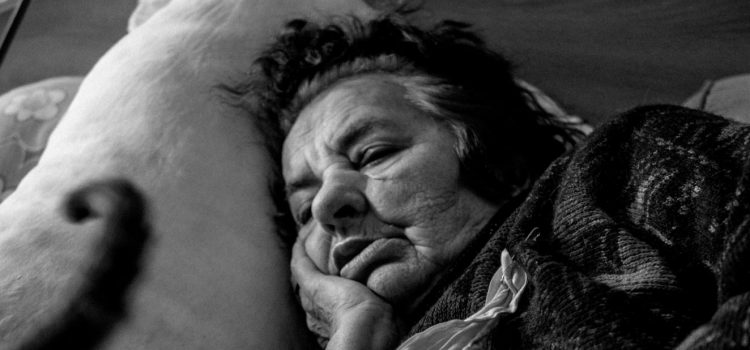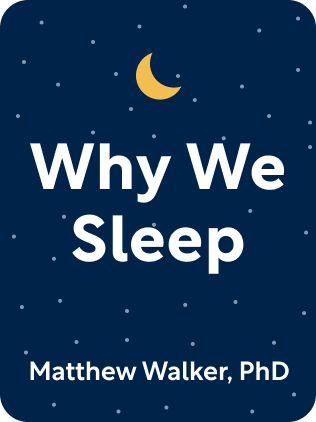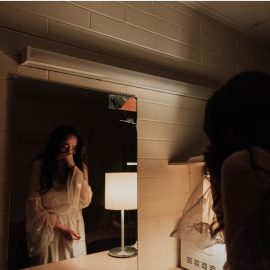

This article is an excerpt from the Shortform summary of "Why We Sleep" by Matthew Walker. Shortform has the world's best summaries of books you should be reading.
Like this article? Sign up for a free trial here .
Why do seniors seem to sleep less? Do human bodies require less sleep in old age?
According to Matthew Walker, the author of Why We Sleep, seniors require the same amount of sleep as they did when they were younger. However, they often struggle to get their full 8-hours for a number of reasons.
Continue below to learn why sleep gets more difficult as you age.
Sleep in Adulthood and Old Age
Sleep quality starts deteriorating in your late 20s, with deep NREM sleep becoming impaired in length and power. In your late 40s, you’ll get 70% less deep sleep than you had as a teenager; by age 70, you’ll have lost 90% of deep sleep. Unfortunately, less NREM sleep worsens your ability to cement new memories as you grow older.
You often hear of the elderly sleeping little at night, so the natural conclusion is that people don’t need much sleep in old age. But Matthew Walker says this could be a myth. The elderly might be sleeping less because they’re unable to sleep for as long. This means they could still benefit from more sleep.
(Shortform note: The National Institute on Aging says that older adults needing less sleep is a common misconception. Older people still need seven to nine hours of sleep a night.)
Why Do Seniors Sleep Less?
Walker notes that seniors have three things that keep them from enjoying more restorative sleep: 1) They sleep less than younger people, 2) they have less efficient sleep, and 3) they want to sleep earlier. This is caused by:
- Degeneration of the mid-frontal cortex that generates sleep
- Weakened bladders causing night interruptions
- Circadian rhythm shifting to earlier times
There are several other factors that exacerbate the poor sleep quality of seniors:
- We’re generally unable to determine our sleep quality after sleeping. When seniors sleep poorly and feel unhealthy, they don’t realize they need to improve their sleep quality. They chalk it up to insomnia.
- Because the elderly sleep poorly, they feel tired during the day, and doze off in the early evening. Unfortunately, this reduces the adenosine sleep pressure at night, which causes them to have trouble falling asleep later. Then, their early circadian rhythm wakes them up before they can get a full night’s rest. This causes a vicious cycle of poor sleep.
(Shortform note: Another factor that Walker doesn’t mention is menopause, which can cause sleep problems in middle-aged women. Forty percent of women in their late 40s to early 50s experience issues like insomnia, sleep apnea, and sleep disruption caused by hot flashes or restless leg syndrome. These problems begin at perimenopause and last until postmenopause—a period of about seven years. If you’re at this stage, increase your chances of having a good night’s sleep by avoiding big meals and spicy food before bedtime (as these can lead to hot flashes), reducing stress and managing anxiety that may keep you up at night, wearing lightweight clothes to bed, and having a change of clothes on hand so that you won’t have to get up in case of night sweat. Hormone replacement therapy may help with sleep difficulties but poses risks for some women.)
Walker says that all this causes lower sleep efficiency—people in their 70s have 80% sleep efficiency, meaning they stay awake in bed for 1.5 hours when trying to sleep eight.
There are a few ways for seniors to get better sleep:
- Melatonin helps strengthen the desire to sleep in elderly people. It reduces time to falling asleep and improves reported sleep quality.
- Seniors who want to push their circadian rhythm back should get bright-light exposure in the late afternoon, not in the mornings.
(Shortform note: Seniors who don’t get enough sleep are more prone to accidents and falls, so the Sleep Foundation suggests some sleep safety tips: Keep a phone or a list of important phone numbers on your nightstand, but avoid keeping a cellular phone nearby—the notifications, bright screen, and temptation to scroll can keep you up. Have easily accessible light switches and clear pathways of hazards like cords and furniture to reduce your risk of tripping or falling if you need to get up in the middle of the night.)

———End of Preview———
Like what you just read? Read the rest of the world's best summary of Matthew Walker's "Why We Sleep" at Shortform .
Here's what you'll find in our full Why We Sleep summary :
- Why you need way more sleep than you're currently getting
- How your brain rejuvenates itself during sleep, and why nothing can substitute for sleep
- The 11-item checklist to get more restful sleep today






